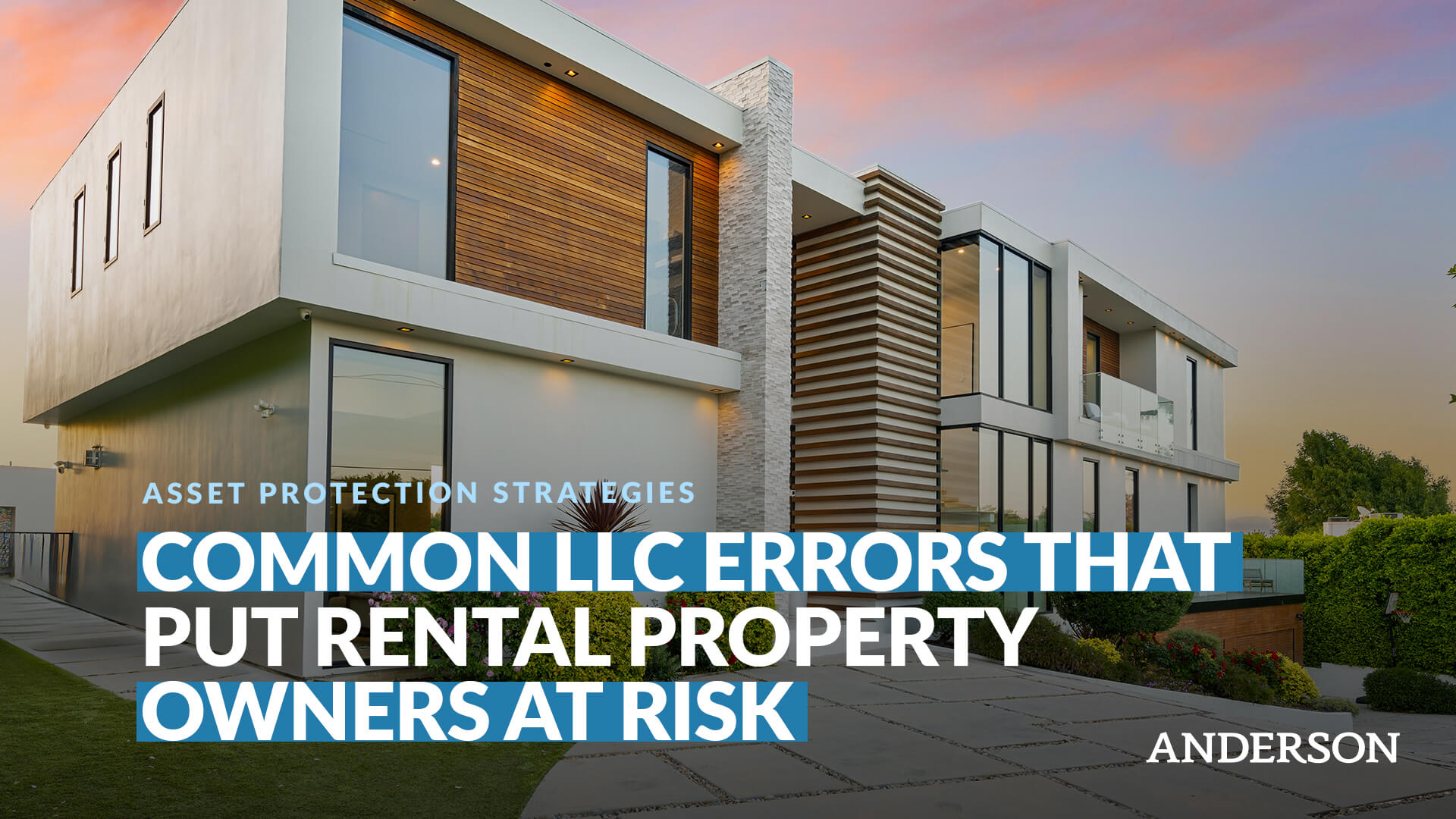
Why LLC Mistakes Matter
Many real estate investors create an LLC for asset protection, thinking the work is done. But a limited liability company LLC is a legal entity that must be structured and managed properly to provide real protection. If you don’t, courts can still pierce your corporate veil and take your personal assets.
The difference becomes clear in real cases. In Georgia, a landlord avoided personal liability when a rental property deck collapsed, because he was out of state and had no way of knowing the deck was defective. The lawsuit was contained to the LLC. In Washington, another landlord noticed unused bolts under a new deck, called the contractor, and the court held her personally liable when the deck collapsed.
These examples show how easy it is to pierce the corporate veil if you assume duties personally. Understanding how LLC liability works is essential for anyone who owns investment properties.
For more about these case studies, check out my video here.
Understanding LLC Protection
What is the biggest LLC mistake real estate investors make?
The biggest mistake is believing an LLC is a business tool that provides automatic protection. In reality, you only gain limited liability protection when you treat the entity as separate from your personal finances. If you commingle funds, act as your own contractor, or ignore formalities, you risk losing protection and exposing yourself personally.
Will an LLC keep me from being sued personally for my rental property?
Yes. Owning real estate investments in an LLC reduces risk, but does not eliminate it. When you assume a personal duty, such as making repairs or overseeing construction, a court can still sue you personally. This is how courts justify piercing the corporate veil and going after you directly.
How does LLC protection for rental property work?
Unlock the Secrets of Top Real Estate Investors — Save Your Free Spot Today!
Join our FREE Virtual Tax & Asset Protection Workshop to discover how to slash your taxes, shield your assets, and secure your financial future.
Live Q&A with Experts | Real Strategies You Can Use Immediately
LLC protection for rental property works by creating a separate legal entity that owns the property. If a tenant or guest sues, the court generally limits their claim to that entity. This shields your home, savings, and other personal finance assets. Properly structured, an LLC prevents plaintiffs from reaching beyond the rental to your personal accounts.
Structuring LLCs for Rental Property
What is the best way to structure an LLC for real estate investors?
Forming an LLC is only the first step. The real protection comes from how you structure and maintain it.
The strongest method is layering:
- Place each rental property in its own LLC.
- Use a Wyoming holding LLC as the sole member for privacy.
- Keep yourself listed only on the Wyoming entity, not each property LLC.
This arrangement combines limited liability protection with anonymity. Attorneys searching public records won’t find your name linked directly to investment properties.
Do I need one LLC per property?
Yes. Holding multiple rentals in one LLC is a common real estate LLC mistake. When one property faces a lawsuit, the lawsuit exposes all the other properties in that LLC. One LLC per property isolates liability and is a safer approach for landlords with growing real estate investments.
Should landlords manage property themselves if it is in an LLC?
Self-managing repairs or inspections weakens protection. Even with an LLC, if you personally perform work, courts may argue you assumed responsibility. To keep liability inside the entity:
- Hire licensed contractors.
- Sign leases and contracts in the LLC’s name.
- Maintain professional separation between yourself and the property.
Filing and Compliance
What does it cost to set up an LLC?
Each state requires a filing fee, usually paid to the Secretary of State. Fees vary, but range from about $50 to $500 depending on the state. Some states also require annual fees or franchise taxes. These costs are part of maintaining your legal entity in good standing.
Why is a registered agent important?
Every LLC must have a registered agent to receive legal and tax documents. Using a professional registered agent, rather than your personal address, adds privacy and ensures you don’t miss critical compliance notices. Losing good standing with the Secretary of State weakens your liability protection.
How do I keep my LLC in good standing?
To maintain limited liability company status, you must:
- File annual reports with the Secretary of State.
- Keep minutes or resolutions when making major decisions.
- Maintain separate bank accounts for business operations.
- Pay taxes appropriately under your chosen election.
Ignoring these steps can give plaintiffs grounds to argue the LLC is not a true legal entity, which makes it easier to pierce the corporate veil.
Tax Considerations for LLCs
What are the tax benefits of using an LLC for real estate investors?
An LLC offers flexibility and tax benefits. By default, the IRS disregards single-member LLCs for tax purposes and taxes multi-member LLCs as partnerships. Both allow profits and losses to pass through to your return.
You can also elect S-Corporation status for certain activities to reduce self-employment taxes. Rental property owners can claim depreciation, mortgage interest, and expense deductions. This makes the LLC one of the most tax-friendly structures for landlords and small business owners.
Do LLC owners still have to pay taxes personally?
Yes. Even though an LLC is a separate legal entity, the income typically flows to you personally through pass-through taxation. You must still pay taxes on rental income, though strategic deductions help offset it.
Do banks require personal guarantees for LLC loans?
Often, yes. Many lenders will require a personal guarantee when financing investment properties in an LLC.
This means you personally back the loan if the LLC defaults. While not ideal, it is common in real estate financing.
The key is to balance this risk with proper structure and insurance.
Pros and Cons of LLCs for Real Estate
What are the pros of using an LLC for rental property?
- Protect your personal assets from lawsuits.
- Keep investment properties separate from personal finance.
- Create credibility with lenders, tenants, and contractors.
- Enjoy tax benefits and flexible elections.
- Shield your name from public records with a holding company.
What are the cons of using an LLC for real estate?
- Filing fees and ongoing costs with the Secretary of State.
- Administrative work, such as maintaining separate accounts.
- Possible personal guarantees for loans.
- Risk of liability if you ignore formalities or self-manage.
These pros and cons highlight that while an LLC is a business tool, it requires ongoing discipline.
Is an LLC worth it for small business owners and landlords?
Yes. For both small business owners and real estate investors, an LLC provides a balance of liability protection, tax benefits, and professionalism. The pros typically outweigh the cons when you own investment properties, especially if you are serious about protecting your wealth.
Final Takeaway
An LLC can be the foundation of strong asset protection for landlords, but only if used correctly. Real estate LLC mistakes such as holding multiple properties in one entity, ignoring compliance, or managing property personally can erase the protection you thought you had.
An LLC operates as a business, and you must structure, fund, and maintain it like any other business. Done correctly, it creates limited liability protection, safeguards personal finance, and provides flexibility to manage and grow real estate investments.
Schedule Your Free 45-Minute Strategy Session Today
Don’t leave your investments exposed. In just one call, you’ll walk away with a custom plan for structuring your LLCs the right way, filing with the Secretary of State, and locking in long-term protection for your investment properties. This session is completely free—and it could save you from costly mistakes down the road.














